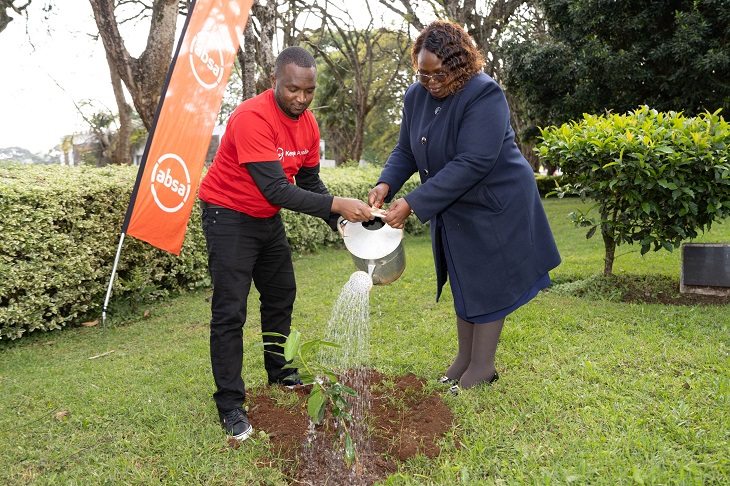Kenyan businesses, like those in many other parts of the world, have faced numerous challenges over the last year. Disruption of the global supply chain, as well as the recent spike in the dollar exchange rate, are just a few examples of global issues that have hurt businesses.
Most business owners would understandably prioritize pressing issues such as bridging cash flow and ensuring business continuity. Even though the ‘green business agenda’ appears to have been put on hold, banks are still playing an important role in financing and advocating for this transition.
Kenya’s financial sector, like the rest of the world, is shifting toward clean energy as lenders adopt Environmental Social and Governance (ESG) goals voluntarily and by regulatory changes.
Regulators are eager to protect companies in their jurisdictions from being locked out of financing options, which could disrupt operations if the firms they regulate are unable to access local and international finance. The Central Bank of Kenya (CBK) issued green finance taxonomy and climate finance reporting guidelines to encourage lenders to take climate change seriously, particularly in light of global resolutions such as the Conference of Parties, which have a direct impact on the credit, market, liquidity, and reputational risks of local banks. The Nairobi Securities Exchange also issued an ESG manual to help listed companies measure and report on ESG issues, becoming Africa’s fourth exchange to do so.
Banks must plan, execute, and track ESG goals to maintain long-term sustainability and access global funding lines that require clean energy compliance. ESG compliance extends beyond a lender’s internal processes to its supply and value chains, allowing banks to assess the businesses to which they lend. Banks are under increasing pressure to examine their loan portfolios closely and gradually shift away from projects that use fossil fuels or harm the environment.
One of the most frequently asked questions is whether banks should avoid, for example, a school that cooks with firewood and charcoal or a business that sells combustion engine cars in the market.
Absa Bank’s approach has not been to prevent clients from accessing funding, but rather to accompany them on a journey to help them realign their priorities by demonstrating how transitioning to clean energy benefits them.
For example, we promote the long-term viability of small businesses by providing access to the skills and information required to start one and making existing businesses more competitive. By understanding our customers’ businesses, we can provide advice on how to meet their priorities while also achieving ESG goals.
As a bank, we recognize that, while many businesses want to transition to clean energy, the initial cost of installing the technology has been prohibitively expensive. This has created a new opportunity for us to help fund this shift, resulting in near-term cost savings. We also assist businesses in recognizing that pursuing a clean energy transition can lead to numerous funding opportunities, which are sometimes incentivized in terms of cost and quantum.
As renewable energy investments gain traction in Kenya, banks are committing to ring-fencing portions of their portfolios to finance businesses as part of a clean strategy transition. By 2025, Absa Bank has committed to investing at least 10% of its capital in climate finance to promote green energy, green building, and sustainable agribusiness. We have already invested KES60 billion in sustainable investment and financing, as well as in operational activities, to help accelerate climate transition and promote inclusive growth. We intend to double this by 2025 as we continue to fulfil our commitment to creating shared value and being a Force for Good in our community.
We believe in collaboration and have utilized experts from the International Finance Corporation (IFC) to help us map out our capital financing portfolio for renewable and clean energy projects. We also continue to collaborate with like-minded partners to advocate for meaningful dialogue on these crucial topics. Absa Group, for example, is cooperating with the African Development Bank (AfDB) to host a thought-provoking, interactive panel discussion on the sidelines of this year’s AfDB Annual Meetings in Nairobi at the end of this month. The purpose of this session is to facilitate open discussions that acknowledge Africa’s challenges in achieving a just transition while also identifying opportunities and adopting a solution mindset that acknowledges the roles of both the private and public sectors in catalyzing the continent’s green transition.
Overall, Absa’s interventions aim to foster a strong and diverse business sector by nurturing aspiring entrepreneurs and assisting businesses in becoming more environmentally friendly. We accomplish this by offering customer-centric banking solutions that enable and improve business productivity, as well as access to funding and credit to help them establish and grow.
The experience has been eye-opening. While many businesses seek funding for specific priorities, when they consider clean energy goals, they are often able to better understand the direction of their growth and discover very simple ways in which they can contribute to greening the future.
As the story of our sustainable journey unfolds, we recognize our growing role as stewards in a world increasingly focused on environmental, social, and governance issues. We are making significant progress on our sustainability agenda, which is supported by a firm commitment to ensuring that our operations and those of our customers are consistent with environmental and social imperatives.
According to a UNEP study conducted in 2023, Africa’s green business opportunities are abundant. Africa, for example, can become a renewable energy trailblazer with abundant solar, wind, hydro, biomass, and geothermal resources, potentially contributing to a 6.4% increase in GDP between 2021 and 2050. With an annual funding gap of $213.4 billion in climate financing in Africa, this provides an opportunity for innovative investors and financial sector players to make a difference by strengthening Africa’s climate resilience.
Related Content: Stanbic Sets The Ball Rolling For Kenya’s First Green Affordable Housing Project
James Agin is Managing Executive, Corporate and Investment Banking at Absa Bank Kenya











